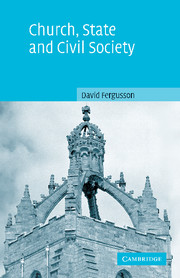Book contents
- Frontmatter
- Contents
- Preface
- 1 The politics of scripture
- 2 Church and state: theological traditions
- 3 Crises of liberalism
- 4 The theological case for toleration
- 5 Moral formation: the church's contribution
- 6 Modern social theology: Barmen and Vatican II
- 7 Church and nation
- 8 In the twilight of establishment
- Bibliography
- Index
8 - In the twilight of establishment
Published online by Cambridge University Press: 02 December 2009
- Frontmatter
- Contents
- Preface
- 1 The politics of scripture
- 2 Church and state: theological traditions
- 3 Crises of liberalism
- 4 The theological case for toleration
- 5 Moral formation: the church's contribution
- 6 Modern social theology: Barmen and Vatican II
- 7 Church and nation
- 8 In the twilight of establishment
- Bibliography
- Index
Summary
It is hardly too much to say that during the twentieth century Great Britain lost its historic identity as a Protestant nation.
(Peter Clarke)Young Christians in the Europe of today come to their faith through individual choice which thrusts them back on the pure Gospel. So they have a thirst for religious experience and good teaching.
(John Wilkins)THE BRITISH CONTEXT
This final chapter ends on a more parochial note by considering the ongoing debate surrounding establishment in the United Kingdom. It has been argued already that beyond Christendom a church can exercise a publicly significant role without functioning as an established, state-recognised church. The conclusions of this chapter are thus largely anticipated. Indeed, if some sociological analyses are correct it may even be the case that a church's public contribution today is likely to be greater where its links with the state are kept to a minimum. By functioning as an institution of civil society in partnership with other groups, churches can continue to be significant in more pluralist settings where the state cannot be identified with any one religious party. In any case, citizens in diverse societies prefer to choose their religious identity rather than to have this institutionally prescribed. Where a majority exists outside the national church there will always be awkward criticisms levelled at the political privileging of one religious institution. This inevitably raises issues about the viability of establishment.
Some attention to terminology is required at the outset.
- Type
- Chapter
- Information
- Church, State and Civil Society , pp. 167 - 194Publisher: Cambridge University PressPrint publication year: 2004

